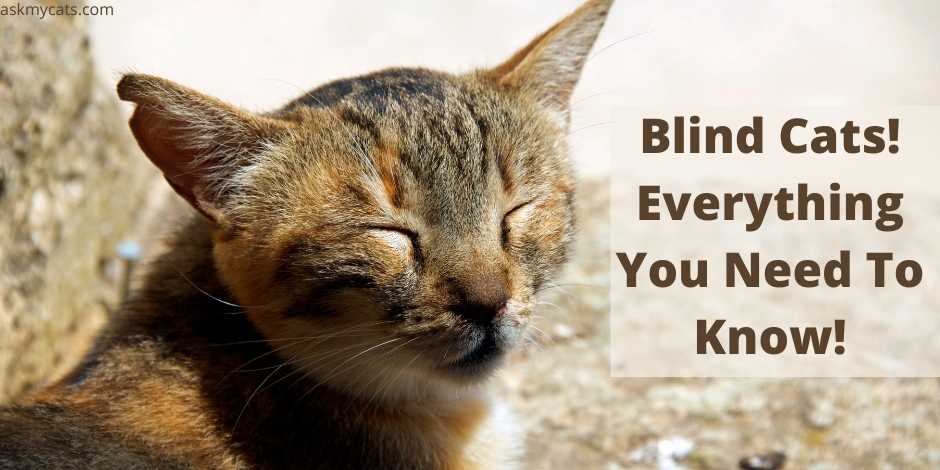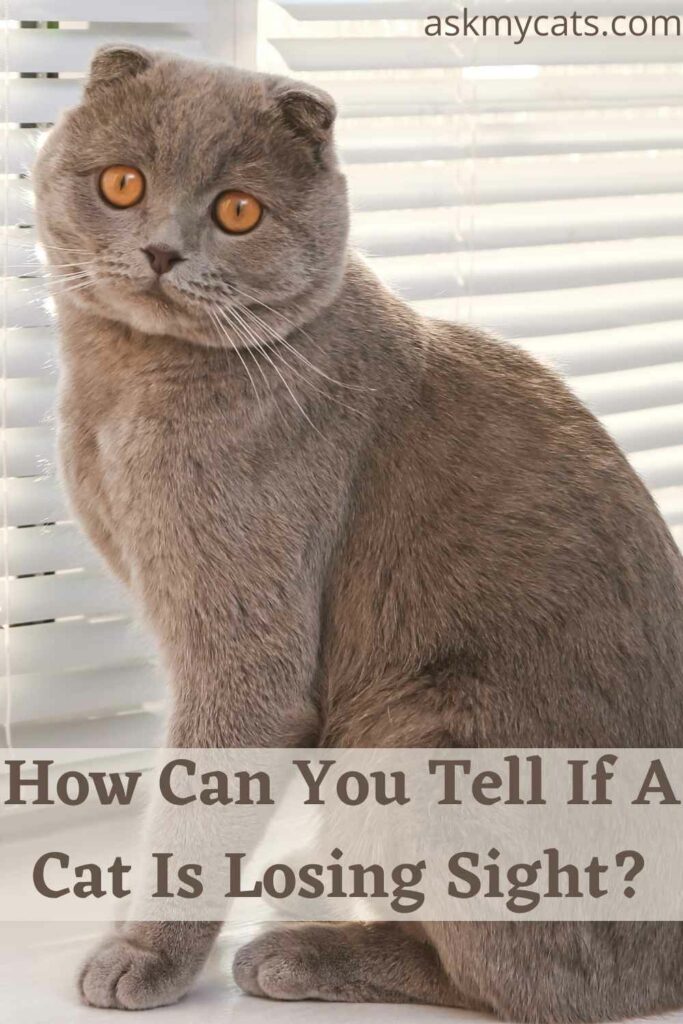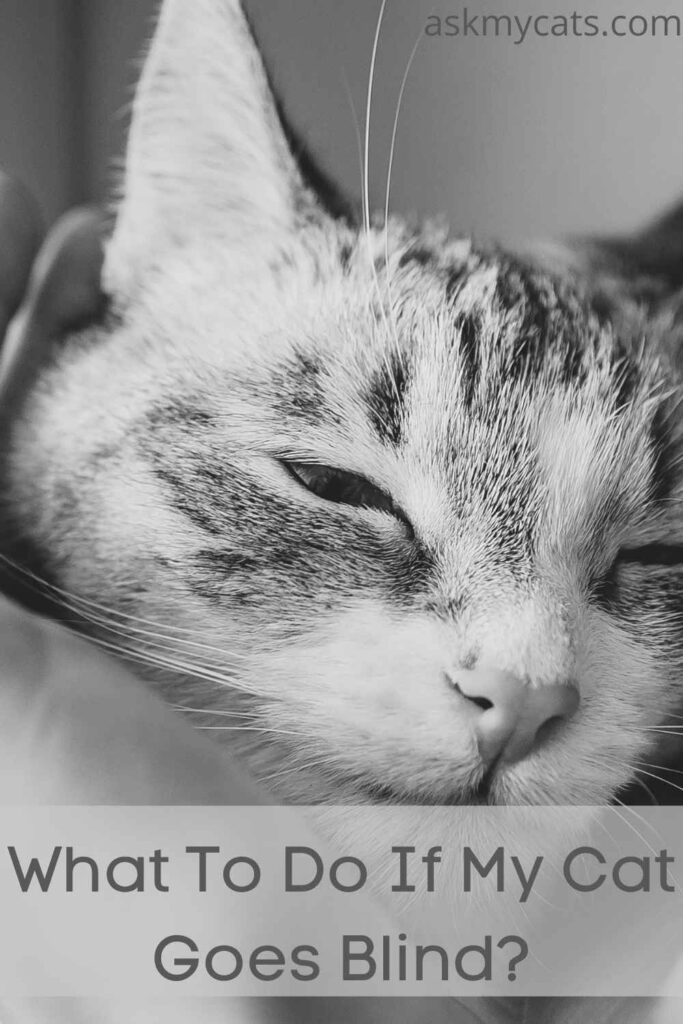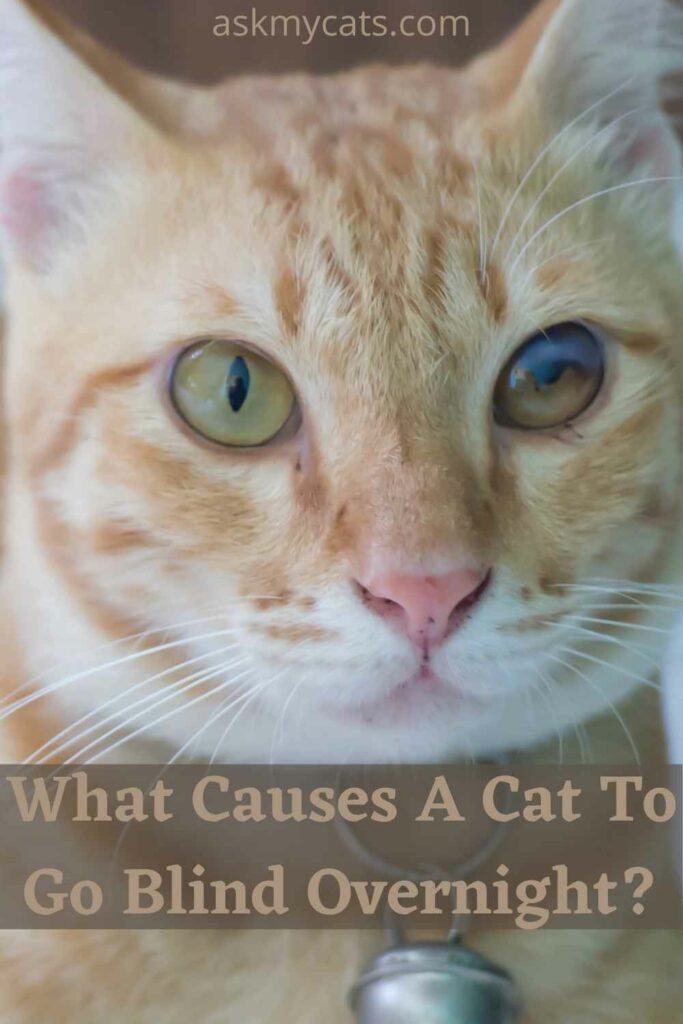Whether your cat is blind from the start or you have adopted a blind cat, you will for sure be thinking about how to give your cat its best life.
Although blind cats will need special attention and care from their owners, they can live a happy and fulfilled life and give you lots of affection in return.
This article will help you clear all your doubts about blind cats, so let’s get started.


Give Your Cat the Perfect Day
Get the Free Ebook!
How Can You Tell If A Cat Is Losing Sight?
You can tell if a cat is losing sight by looking for behavioural changes, noting changes to the eye and walking pattern of the cat.

Looking For Behavioural Changes
Keep an eye out for clumsiness. Keep an eye on your cat to watch how it navigates around furniture and whether it jumps on it incorrectly.
Keep track of if your cat runs into walls or furniture that it was previously accustomed to walking around.
Clumsiness in places where it spends a lot of time can indicate declining vision or blindness.
Another indicator to keep an eye out for is if your cat is tripping on the stairs or slipping when attempting to jump up to its favourite spot.
Take note if your cat has trouble finding other familiar things, such as its food and water bowls.
Keep an eye on your cat’s steps. Pay attention to how your cat moves. If it’s squatting closer to the ground, take note.
It could be navigating using its nose and whiskers. Other warning signals include your cat walking with its head down or moving its head up and down to judge distances.
If your cat is walking aimlessly, that’s another sign to check for.
Listen to your cat. Have you noticed an increase in your cat’s vocalisations? When cats can’t see well or are blind, they become louder to express their displeasure.
As your cat adjusts to its loss of vision, you may find that it is apprehensive, fearful, or agitated in general.
You may also notice that your cat is more susceptible to being frightened.
Keep an eye on your cat to see if they seem clingy. Keep an eye out for signals that your cat isn’t as confident as usual. Take note, for example, if your cat clings to you more or spends more time around you.
Also, keep an eye on whether your cat sleeps more or moves about less than usual.
Noting Changes To Eye
Examine your cat’s eyes to see what colour they are. A change in eye colour is one of the changes you may notice. Look for more significant redness in your cat’s eyes as well.
Alternatively, you may notice that your cat’s eyes have become milkier, cloudier, or whiter.
Examine the tissues around your cat’s eyes for extreme redness. It’s pretty standard if this is a lighter pink.
Cataracts may be present if the lenses of your cat’s eyes are opaque.
Put your cat’s threat response to the test. Without making contact with the cornea, quickly move a fingertip towards your cat’s eye.
When you move your fingertip towards a seeing cat, they will flinch or blink, but a blind cat would ignore it. Don’t come too close to your cat’s whiskers or blow on them, so it doesn’t see your finger approaching its face.
Check for glaucoma by looking at the size of the eyes. Take your cat to the vet if one eye appears to be larger than the other. This could be a symptom of glaucoma.
While this does not necessarily imply that your cat is blind, glaucoma can lead to blindness if left untreated.
It’s also possible that one or both eyes are hazy.
Toss a ball of yarn in front of your cat and see what happens. Please take note of whether she is watching or following the ball’s drop. The majority will drop the ball of seen cats.
As the ball passes in front of a blind cat, it will stay unaware. Avoid getting too close to your cat’s whiskers, so it doesn’t sense the ball.
What To Do If My Cat Goes Blind?
If you find out that your cat is going blind, the immediate step is to go to the vet for a diagnostic.

1. Visit The Vet
Visit the veterinarian with your cat. If you think your cat is blind or is about to go blind, take it to the vet.
Give your veterinarian a summary of your worries, as well as a list of the symptoms you’ve experienced.
Take your cat to the vet as soon as possible since prompt treatment can help prevent overall blindness or detect a serious condition that may have caused the symptoms you’ve noticed.
Blindness can be a sign of a variety of dangerous illnesses, including excessive blood pressure.
Because high blood pressure can lead to strokes and seizures, it’s critical to catch it early.
2. Maintain Consistency
Maintain a stable environment at home. Make a few modifications to your cat’s habitat as possible. This will assist it in adjusting to its blindness.
Food and water dishes, as well as litter boxes, should not be moved so that your cat can readily find them.You can also lower the furniture or provide ramps so it can climb onto it more readily.
Keep your flooring clear of clutter to make it easier for your cat to move about.
3. Identification
Learn how to identify your cat. If your cat escapes the house, have it microchipped. Make sure your cat has a collar and identification tags. Put a tag on your cat that says they are blind or has poor vision.
4. Supervise Outdoors
Keep an eye on your cat when it’s outside. If you take your cat outside, make sure it is escorted and kept in a secure area. Otherwise, keep your cat indoors to keep it safe.
Close the windows and doors to keep them inside. Similarly, any pet doors should be boarded up.
5. Avoid Startling Your Cat
Make sure you don’t startle your cat. Try not to startle your cat by making loud noises. Please make every effort to be calm in its presence and to keep it tranquil.
Family members, especially children, and visitors should be warned not to make loud noises or do anything else that can startle your cat.
Say something out loud when you enter a room, so your cat knows you’re coming.
Cats do not pity themselves because of their impaired vision; instead, they move on with their lives. Some causes of blindness, like high blood pressure, necessitate specialised therapy that your veterinarian will prescribe.
There are several easy but effective ways to alter the home and garden to accommodate a visually impaired cat.
What Causes A Cat To Lose Eyesight?
The reasons why a cat could lose its eyesight could be from injury or tumours to infection and hypertension.
- According to the Veterinary Vision, INC. website, high blood pressure (hypertension) is usually connected with vision loss and is one of the more common causes of retinal detachment. Blood vessels in the retina are damaged by high blood pressure, resulting in bleeding or fluid seepage. This can cause the retina to separate or detach, which can result in blindness.
- Optic neuritis, or inflammation of the optic nerve, is uncommon in cats. However, it does occur and is linked to viral illnesses like feline infectious peritonitis, protozoal infections like toxoplasmosis, and fungi like cryptococcosis. All diseases of the optic nerve that induce degeneration and usually result in a sudden visual field issue or total loss of vision in one or both eyes are referred to as “optic neuritis.”
- Retinal degeneration can result in the loss of light-sensitive cells in the retina, resulting in blindness. Though this is typically a slow and progressive condition, the ultimate stages of visual loss can appear abrupt.
- Lens diseases like cataracts and displaced lenses are relatively uncommon, and while they impede vision, they do not always imply that the cat is blind.
- Secondary blindness can occur due to a brain disease’s inability to process sensations received from the eye. Trauma, infections, inflammation, and malignancies are the most common underlying causes.
What Causes A Cat To Go Blind Overnight?
The most common reason among cats to go blind overnight is high blood pressure, also known as hypertension.

High blood pressure is one of the most common causes of sudden blindness in an aged cat (hypertension).
The increasing pressure pulls the light-sensitive layer known as the retina away from the rear of the eye, which can happen in a matter of seconds.
Even in bright sunshine, the affected cat’s pupils will be significantly dilated, and blood may be visible when gazing into the eyes.
They will appear disoriented, will bump into things, and may over-communicate.
An overabundance of thyroid hormone is the most common cause of high blood pressure in cats, but it can also be caused by kidney illness or diabetes.
This is why blood tests are necessary for the veterinarian to determine which condition to treat.
By inflating a cuff just above the paw on a front leg, we measure cats’ blood pressure in the same way that human doctors do, but instead of using a stethoscope, we use an ultrasonic probe to listen for blood flow.
When the cuff is wrapped around the base of the tail, some cats become calmer. Several readings usually are made to ensure that the blood pressure has not been elevated due to stress.
Although drugs are effective in lowering a cat’s blood pressure, the blindness is usually permanent.
Cats are incredibly flexible when it comes to navigating the house and locating food, but they are not safe to let outside due to the numerous risks that exist.
Can You Reverse Blindness In Cats?
It is possible to reverse blindness in cats only if the treatment is started very early, but it is very rare, and in most cases, the blindness is irreversible.
The earlier a cat’s eyesight problems are detected, the higher chance it has of being treated—unless, of course, the animal’s blindness has already been irreversible by the time veterinary assistance is sought.
“An owner should routinely check a cat’s eyes, noting changes in the appearance of either eye,” Dr Kern says. Examine the iris for changes in colour and examine whether one eye appears clouded or if the two pupils do not resemble each other.
Such shifts can identify issues before they become irreversible.”
He tells out that in many situations, early treatment can avert blindness. “We can treat a cat’s high blood pressure with a medication called amlodipine, which may allow a retina to reconnect itself and the cat to regain some vision,” he explains.
Even rapid treatment by a veterinary ophthalmologist, he adds, may not be enough to reverse a case of feline blindness, whether the start was sudden or not.
“Unfortunately,” Dr Kern explains, “not many clinically blind cats will regain their sight by the time we visit them.”
Are Cats Born Blind?
Although it is rare, cats are born blind.
All cats are born blind and remain so till 14 days, but some can be permanently blind.
Cats can become blind for a variety of reasons. A cat may be born blind or suffer from serious neonatal eye infections, resulting in blindness.
Even though cats born blind can live relatively normal lives, they should not be allowed outside. When these cats are in a familiar setting, such as their home, they tend to rely on their senses of hearing and scent for direction.
Frequently Asked Questions?
Do blind cats suffer?
Ans. No, blind cats don’t usually suffer if they are kept in a suitable environment as instead of feeling sorry for themselves, they tend to adapt to the situation.
How can I test my cat’s vision?
Ans. Wiggling a finger near the eye and watching for blinking is an excellent way to test near vision. Avoid touching the whiskers. Place an object in the cat’s path where she wouldn’t expect it to be to test her mid-field vision.
Will my cat recognise me after going blind?
Ans. Yes, cats can easily recognise their owners after going blind as they use other senses such as smell and touch to adapt to the situation.
Final Words
You can easily help your blind cat settle in its environment and give it a happy and fulfil life just by being patient and giving them special attention and care.
As cats can adapt to their situation very quickly if the proper environment is provided. So, there is no need to panic if you find your cat going blind. Just be patient, and everything will be just fine.
For any other questions and queries, you can put them in the comment section.
References
- http://www.eyevet.ie/wp-content/uploads/2009/01/vision_cat.pdf
- https://www.vet.cornell.edu/departments-centers-and-institutes/cornell-feline-health-center/health-information/feline-health-topics/sudden-blindness
- https://books.google.co.in/books?hl=en&lr=&id=AC1P6a6IQrEC&oi=fnd&pg=PA7&dq=blind+cat&ots=h2ccRal5NC&sig=K3Fg9KAu6TNcivks83iKwzMrLZQ&redir_esc=y#v=onepage&q=blind%20cat&f=false
